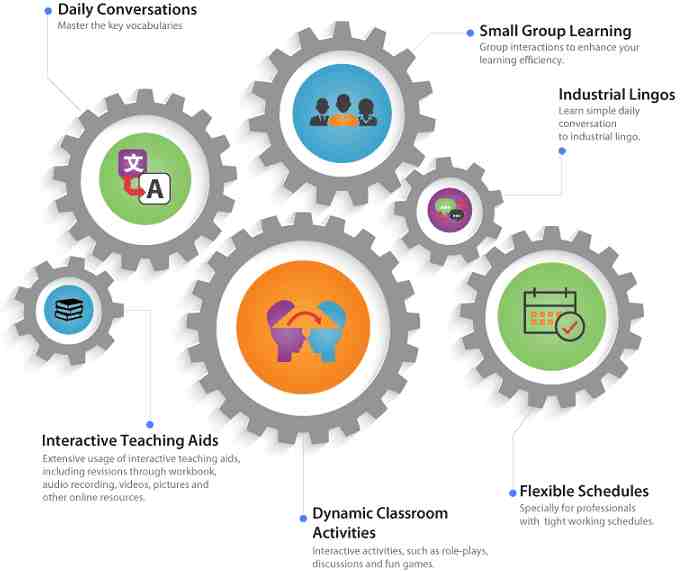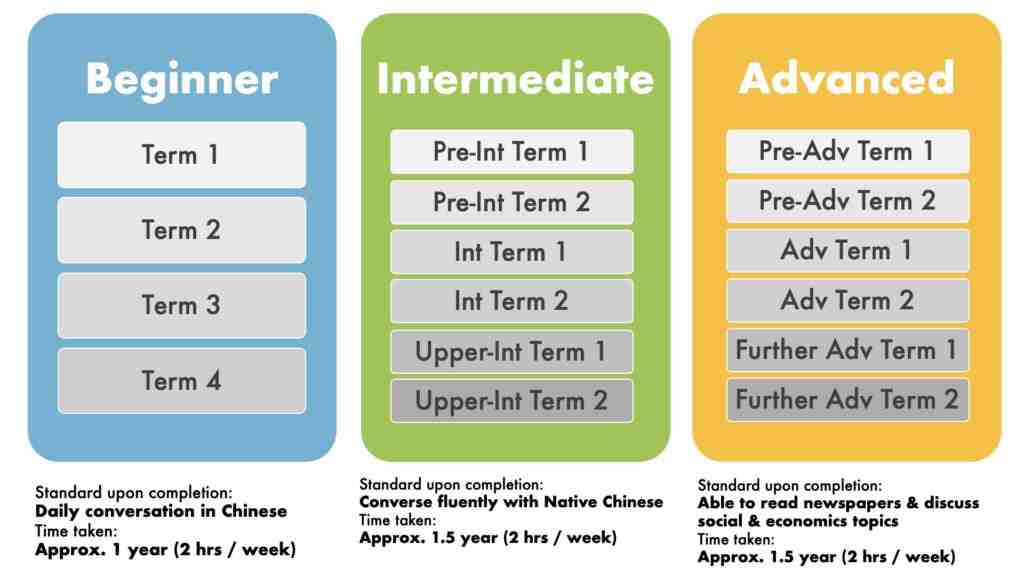Learning Mandarin is a Gamechanger in Singapore’s Hospitality Industry, This is Why
Learning Mandarin is a Gamechanger in Singapore’s Hospitality Industry, This is Why

Hospitality is one of the leading industries in many countries, including Singapore. Data gathered in early 2025 has shown that the hospitality sector is experiencing significant growth, with an increase of 21% compared to previous year. This surge is mainly driven by tourists from China, Indonesia and India. The constantly high demand of lodging options in Singapore is predicted to maintain its superficial growth over the next 5 years, a clear sign of how important the hospitality industry is for the long run.
As previously mentioned, most of the tourists that contribute to this significant increase are coming from China. Given how substantial Mandarin-speaking tourists have been in hospitality industry, proficiency in Mandarin can be seen as an essential skill for hospitality workers. Throughout this article, we will explore how Mandarin can help Singapore’s hospitality industry.
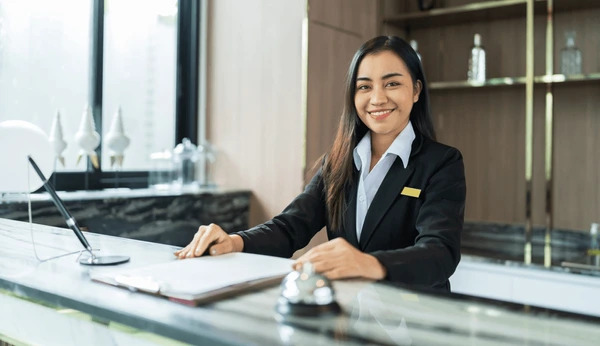
The Rising Importance of Singapore’s Hospitality Industry
Hospitality industry holds a significant role in contributing to the nation’s wealth. Apart from the increasingly growing industry, this role has become essential for Singapore as it will assist a nation in different aspects as the following
- Supporting local businesses – The surge in the hospitality industry is a clear indication of the increasing number of tourists visiting Singapore. Tourists coming to a country will most likely find places to eat and shop locally, supporting small businesses that focus on local cultures.
- Showcasing culture to the world – The increasing number of tourists visiting is also another opportunity to introduce one’s culture globally. Through this opportunity, Singapore can present its rich heritage, diverse cuisines, and unique traditions toward global audiences
- Enhancing national reputation – Having tourists coming to another country is also an opportunity to leave a great impression. By providing positive experiences and excellent services, Singapore can improve their country’s image globally.
- Driving infrastructure development – Given the rise in Singapore’s hospitality industry, the government will most likely be more aware of ongoing infrastructure development. In order to maintain a good reputation from a global perspective, the government will most likely drive infrastructure development further.
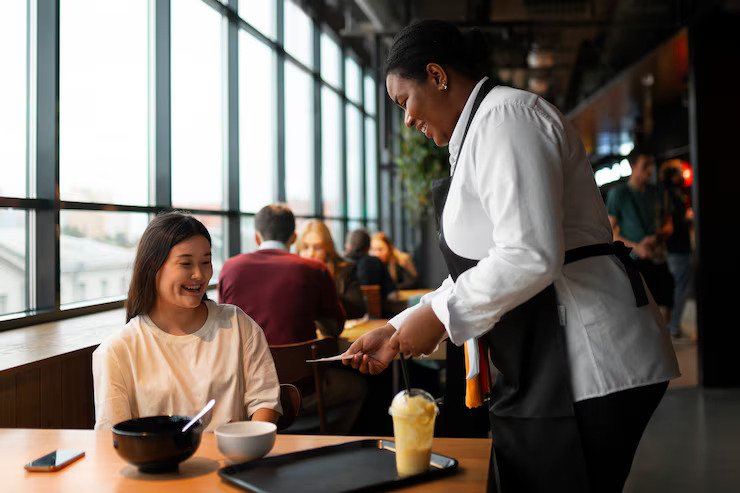
The Role of Language in Hospitality, Is Mandarin Considered Vital?
The rising number of tourists from China has highlighted the strategic value of Mandarin for hospitality. With the Chinese tourism industry booming in Singapore and across Southeast Asia, hotels and restaurants that can cater to Mandarin speakers stand out in the competitive market. Although competency in English is mostly enough for the hospitality industry, here’s why you should consider learning Mandarin as someone working in the hospitality industry.
- Better exposure to global market
Mandarin is ranked second as the most spoken language globally, showing how important its existence is in the hospitality industry. With the skills to communicate fluently in Mandarin, Singapore can open many opportunities for collaboration with other countries, enhancing its hospitality industry. - Show competence
Multilingualism is a sign of professionalism and willingness to provide the best service to guests. Being able to handle situations in the guests’ preferred language exhibits the ability to adapt and can build trust among one another. - Cultural impact
Language is very closely tied to culture. As you are learning language, you will get more familiar with the cultures surrounding it. For Mandarin speaking tourists, culture can play a significant role in their preferences. As someone working in the hospitality industry, cultural sensitivity can help build a better understanding to engage with guests.
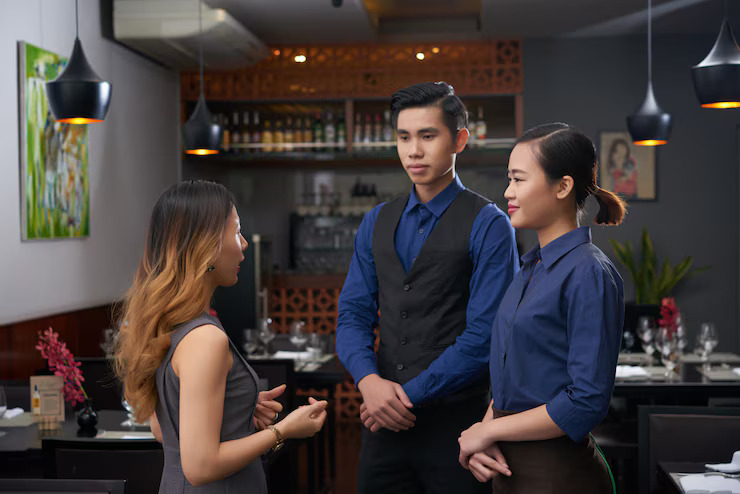
Common Mandarin Phrases for Hospitality Staff
In the previous section, we have discussed how vital learning Mandarin is to enhance service excellence. To start, here are common Mandarin phrases that you should master to be able to communicate with Chinese guests.
- 您好,欢迎光临!
Nín hǎo, huānyíng guānglín!
“Hello, welcome! - 您需要帮助吗?
Nín xū yào bāng zhù ma?
“Do you need any help?”
- 请稍等一下
Qǐng shāo děng yīxià.
“Please wait for a moment.” - 您有预订吗?
Nín yǒu yùdìng ma?
“Do you have a reservation?” - 请出示您的身份证或护照。
Qǐng chūshì nín de shēnfènzhèng huò hùzhào.
“Please show your ID or passport.” - 这边请,给您安排座位。
Zhè biān qǐng, gěi nín ānpái zuòwèi.
“This way, let me arrange a seat for you.” - 请问几位?
Qǐngwèn jǐ wèi?
“How many people?” - 我很抱歉让您经历这一切
Wǒ hěn bào qiàn ràng nín jīng lì zhè yī qiè.
“I truly apologize that you had to experience this.” - 请问您还需要其他服务吗?
Qǐngwèn nín hái xūyào qítā fúwù ma?|
“Do you need any other services?” - 我们会尽快处理。
Wǒmen huì jǐnkuài chǔlǐ.
“We’ll handle it as soon as possible.”

Practical Steps to Improve Service Excellence When Handling Mandarin Speaking Guests
Hospitality industry usually puts a significant weight toward service excellence, committing to provide the best services to the customers. It is important to realise that handling guests is the heart of the hospitality industry and therefore needs to be improved constantly to maintain the industry. Mastering a few key strategies can significantly elevate the way front-line staff serve guests, especially Mandarin speaking guests that dominate the current demographic of Singapore’s hospitality industry. Here’s how to elevate your services!
- Respectful Tone
Mandarin speaking guests usually value respect more than anything else. To leave a good impression, be sure to communicate with formal language and avoid showing frustrations. - Proactive Services
Chinese guests often prefer having proactive assistance that can anticipate their needs. One key way you can try is by accommodating their needs as much as possible and learning what they are actually looking for. - Anticipate Changes
Last minute changes are not uncommon, especially in the hospitality industry. Although last minute changes may come as brutal, it is important to respond with understanding and propose available solutions. - Understand Habits
Chinese guests have several habits that need to be taken into account to provide the best service possible. Some of these habits include things like the preference to travel in groups, preference on certain cuisine, and communication style. - Adjusting Communication Style
Chinese people usually prefer having indirect communication especially when it comes to crisis situations. While it is important to stay transparent, try avoiding causing any confrontation in public. - Personalised Experience
Another important thing that can make your service distinctive is by providing personalised service and experiences. To complete this step, try speaking in Mandarin while handling Chinese guests. Furthermore, you can also try being sensitive over cultural matters and provide services that are tailored specifically to answer their needs while travelling.






